We’ll look back on 2025 as the year the SEO ground shook beneath us, and not in terms of mercurial algorithms. Rather, AI is turning search upside down, to the point where keywords are nearly meaningless.
It used to be that your one and only goal was to get your content to rank highly. Now, thanks to AI, that’s not enough: You need it to rank highly, give readers exactly what they’re looking for, and ideally land as a reference in one-click search (also known as “position zero,” the little AI-generated blurb at the top of many searches these days).
This playbook is essential reading for content, SEO, and marketing decision-makers who want to make the most of that dramatic change and pull ahead of their competitors, without compromising their brand voice.
The challenges content and SEO teams face today
Even the savviest teams are grappling with issues that can hinder their 2025 ambitions.
We should know given that we have one of the best SEO teams in the business — their amazing brains are behind our own high-ranking content and our pioneering AI-powered SEO tools, and they’re seeing the following big-picture challenges facing others in the field.
Making refreshing and optimizing published content routine: Knowing when to update or expand existing content is a persistent puzzle, as is knowing how aggressive you should be when it comes to adjustments. Content performance naturally decays over time, yet many organizations lack data-driven processes for content maintenance.
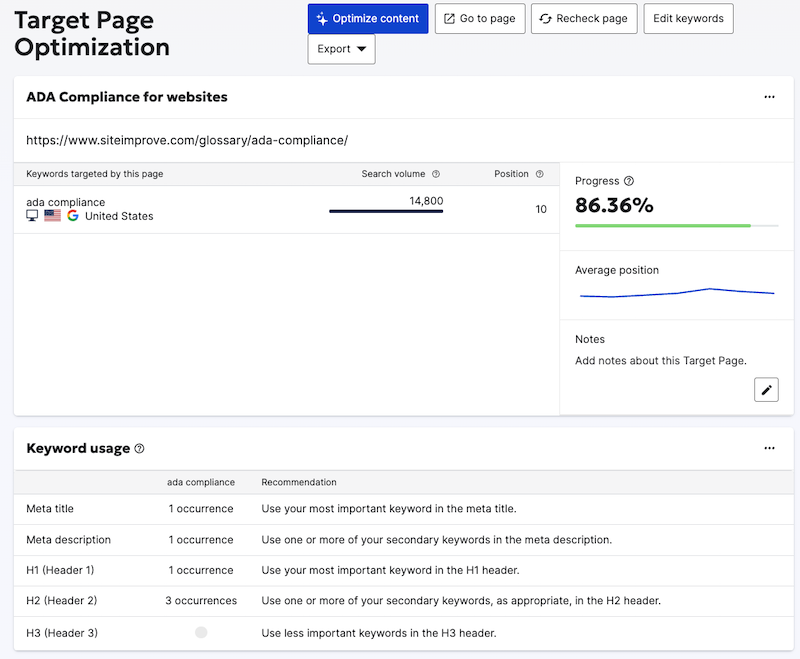
Regular audits and refreshes can significantly boost engagement and rankings. We see it all the time: It’s not at all unusual to see a 30 percent increase in traffic 30 days after a content refresh sprint.
The challenge is determining which pages to refresh and when, before traffic drops off rather than after.
Predicting ROI from content initiatives: With finite time and budget, teams struggle to prioritize content that will deliver real returns. It’s notoriously difficult to connect specific content efforts to bottom-line impact, making it next to impossible to forecast ROI or justify content investments.
Leaders need better insight into which optimizations or new content will move the needle, as well as the confidence to focus on those high-ROI opportunities.
Meeting technical SEO and accessibility standards: Behind every great content experience is a strong technical foundation. Yet ensuring a website is technically sound and accessible to all users is an ongoing challenge. From page speed to mobile-friendliness to ADA compliance, the checklist can be daunting. According to a study by WebAim.org, about 95 percent of websites have WCAG 2 failures, a clear indicator that technical SEO and inclusivity gaps are common.
(If you’re wondering what the connection is between accessibility and SEO, this is the short version: Google indirectly recognizes and rewards sites that are buttoned up in terms of their accessibility. Get your accessibility right and it will positively affect your ranking.)
Bottom line: Teams must juggle SEO best practices and accessibility requirements, often with limited resources, in order to avoid invisible roadblocks that hurt rankings and user experience.
Eliminating silos and inefficiencies: SEO, content, brand, and development teams frequently operate in their own lanes, which leads to fragmented workflows and misaligned priorities. Siloed teams may duplicate efforts or overlook opportunities that a more unified approach would catch, and just about any marketer will tell you that organizational silos make it difficult to align on a single content strategy. (The product team wants one thing, the brand team another, the field marketing team yet another, and the content strategist yet one more.)
Breaking down these silos is critical, and SEO insights should inform content planning, content successes should be visible across marketing, and everyone should be rowing in the same direction.
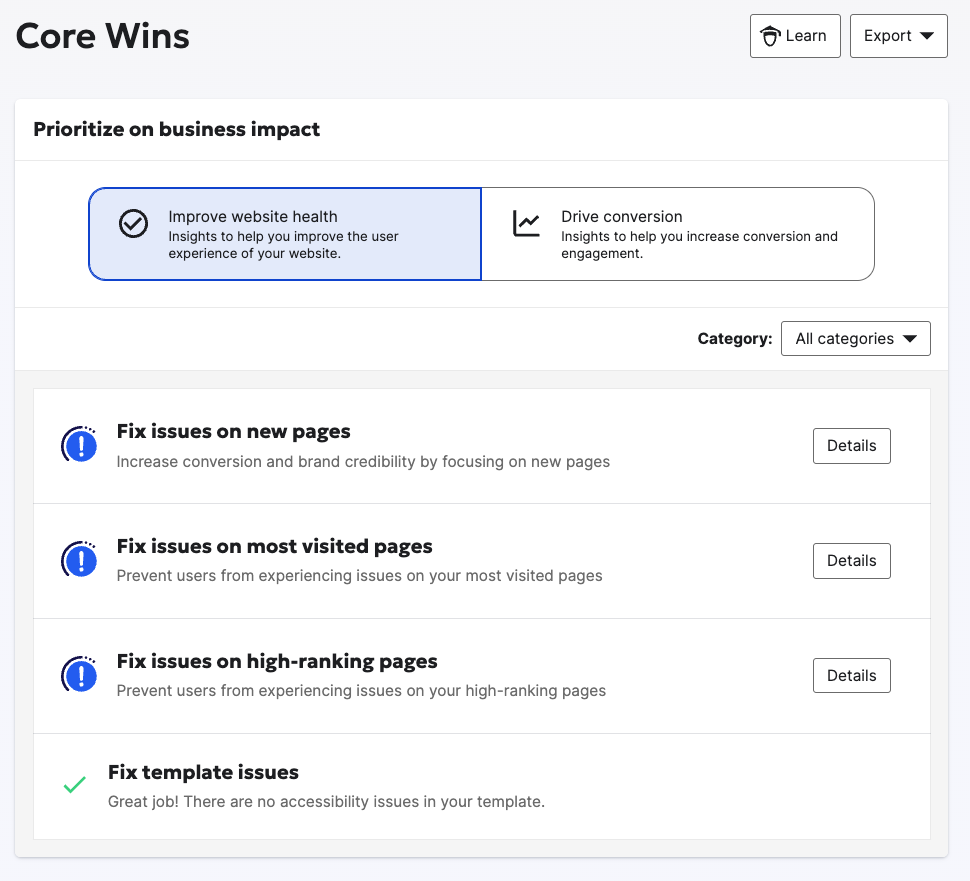
Using AI without compromising quality or trust: Many content teams tap AI in new ways on a nearly daily basis (ours does!). It speeds up production and powers data-driven insights, but you have to be cautious: Yes, it can help increase your volume, but if you don’t keep an eye on it, it can introduce inaccuracies and just plain bad writing, neither of which are good for your brand.
The challenge is harnessing AI as a force-multiplier for your team so you can accelerate research, optimization, and writing and still keep a skillful, badly needed human in the loop. That’s the only way to make sure your content shines and that quality, consistency, and credibility remain intact.
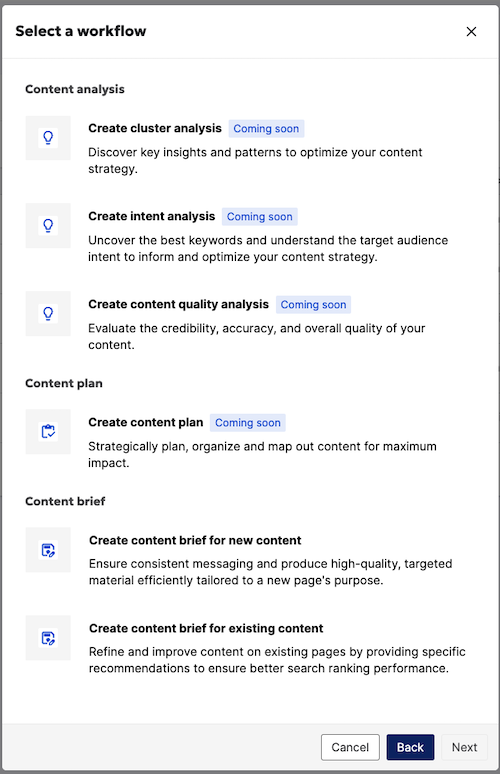
The distilled version of the above? The ingredients for SEO success are strategic insights, automation, and cross-team collaboration.
It’s time to get to know the Siteimprove SEO Intelligence Suite
Siteimprove’s SEO Intelligence Suite is a platform built to address all the above challenges head-on. Launched as a unified, enterprise-grade solution for SEO and content teams, it brings together everything marketers need to plan, optimize, measure, and continuously improve content performance.
Loaded with modules for technical SEO auditing, keyword performance monitoring, AI-generated content briefs, and integrated insights across organic and paid search, it’s an all-in-one command center where marketing teams can see the full picture and act accordingly in real time.
What makes this platform special, especially for the next generation of content marketers, is its intelligent use of AI and data. Unlike traditional single-purpose SEO tools, the suite adds a unique AI layer that surfaces what’s worth acting on right then and there.
A critical point: SEO Intelligence Suite explains why you should act. Rather than chasing the latest algorithm update or reacting after your rankings drop, you can stay proactive thanks to the platform’s AI.
Imagine it predicting which optimizations will likely yield the biggest gains (think predictive prioritization of SEO and content tasks) and alerting you to important changes in search trends or site health before they become problems, all with human-in-the-loop workflows: Your team remains in control of creative and strategic decisions because it uses AI as an assistant rather than a replacement.
The foundational elements of good SEO and UX, like accessibility checks and technical diagnostics, are all there, too, so compliance and quality monitoring go on in the background.
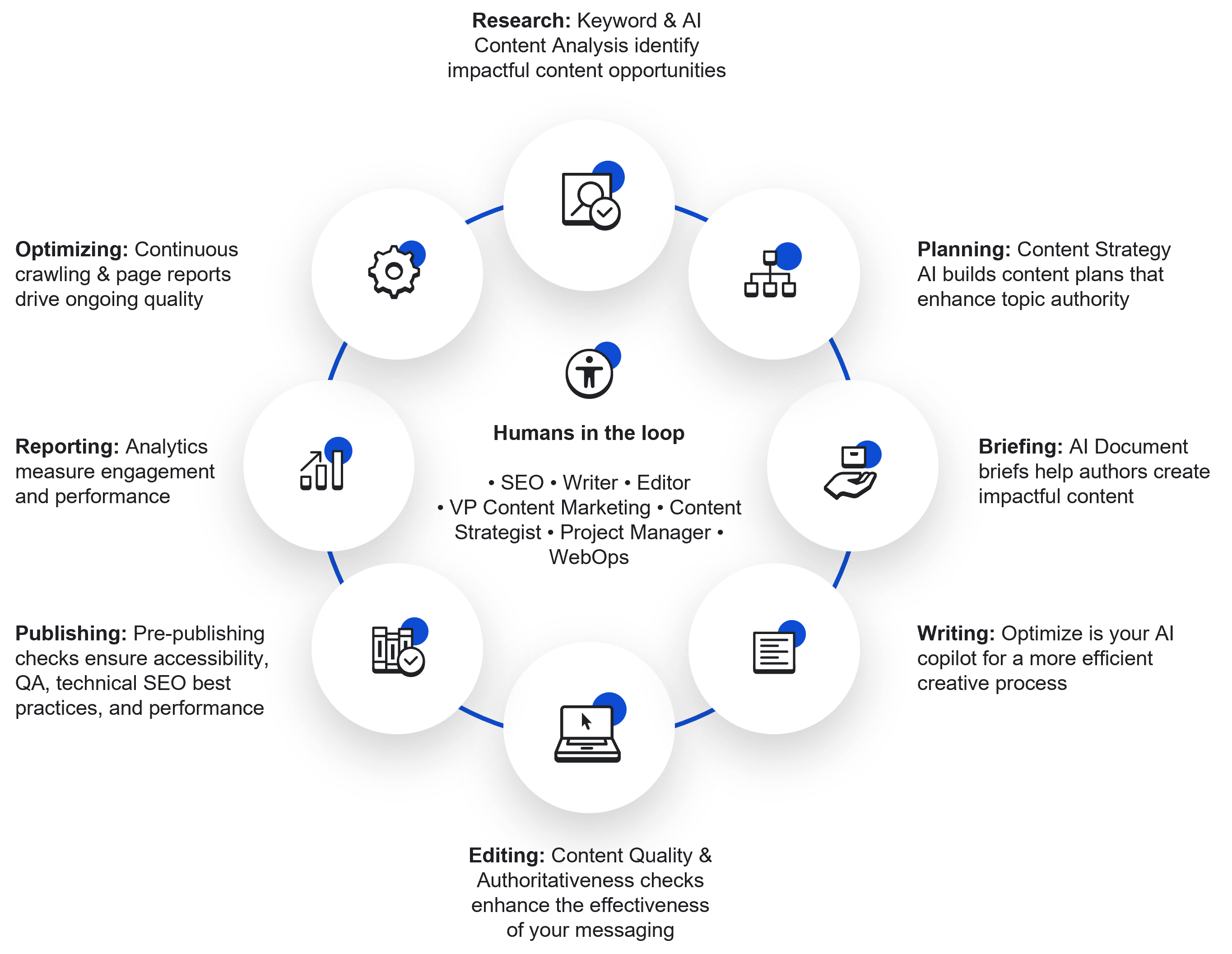
Other key capabilities of the SEO Intelligence Suite include predictive content prioritization, built-in technical SEO & accessibility auditing, AI-driven content planning with human oversight, and cross-team workflow alignment tools. By consolidating these functions, our platform eliminates the need for disparate tools and manual spreadsheets.
Presto, you save enormous amounts of time, and the result is a more agile, data-driven approach to content and SEO. That’s exactly what digital marketing teams need to thrive.
How the platform solves key challenges
Every role in the content and SEO workflow stands to benefit from a more intelligent, unified approach. Here’s how Siteimprove’s SEO Intelligence Suite empowers four key positions on marketing teams to meet their specific goals and breaks down silos among them.
CMO / Marketing leadership
Challenge: Marketing leaders often struggle with fragmented insights (SEO data in one silo, content analytics in another, paid marketing in yet another) and face intense pressure to prove ROI on all these efforts. It’s a constant challenge to align content and SEO initiatives with broader business goals and revenue targets, especially with tight budgets and under time constraints.
What matters most: Successful CMOs and senior marketing executives are laser-focused on high-level outcomes like increased brand visibility, qualified traffic that converts, and maximized martech ROI. They need clear KPIs and reporting to justify spend, plus confidence that all teams are executing a unified strategy. Efficiency and the ability to course-correct quickly (for example, if a campaign underperforms or a search algorithm shifts) are also top of mind.
How Siteimprove helps: The SEO Intelligence Suite gives marketing leaders a single source of truth for content and SEO performance, complete with customizable dashboards and reports that track SEO and content metrics against business KPIs. Think of it as a linchpin in efforts to measure success and communicate value to the C-suite.
For instance, a CMO can see exactly which content pieces drive conversions or how organic search is reducing the need for paid spend. The platform’s real-time insights, like algorithm update alerts and content performance analytics, underpin data-backed decision making rather than gut feeling.
And for all of you who struggle to tie organic performance to outcomes that matter to executives, you can confidently attribute revenue to SEO content, identify cost-saving opportunities (e.g., where strong organic rankings allow budget reallocation from PPC), and make sure that every content initiative ladders up to the overall marketing strategy.
By breaking down data silos and aligning teams around shared metrics, the suite offers marketing leaders full visibility and control: They can finally connect the dots among content efforts and business growth and then champion those successes within the organization.
Digital marketing teams
Challenges: Digital marketing managers and demand generation teams live in a multi-channel world. Gaining a unified view of performance across SEO, PPC, social, and web is pretty difficult when data is fragmented across platforms, and it sucks time like little else.
Limited resources force tough choices and prioritizing, and it’s easy to waste spend if SEO and paid campaigns aren’t coordinated. Additionally, staying on top of fast-changing trends, from new algos to competitors’ moves? That task never ends.
Digital marketing teams have long dreamt of a comprehensive way to see the whole customer journey and all the touchpoints that influence a conversion.
What matters most: Digital marketing teams are measured on metrics like traffic growth, lead generation, conversion rates, and return on ad spend (ROAS). They care about efficient budget allocation: getting the maximum results from each dollar, whether it’s in paid search or content creation.
Agility is key, too. If you can pivot campaigns quickly based on performance data, you’re far better poised to hit your targets. Finally, demonstrating marketing ROI to stakeholders (with hard numbers) is crucial for securing ongoing investment in both martech and staff.
How Siteimprove helps: The Siteimprove SEO Intelligence Suite acts as a central hub for cross-channel insights so digital marketers can monitor SEO and paid campaigns side by side. By unifying organic and paid search data, the platform highlights where there are keyword gaps or overlapping efforts, so you can optimize spend and avoid redundancy.
For example, if a certain keyword is performing well organically, you might reduce bid spend on it, or vice versa, depending on your priorities. The suite’s competitive research tools reveal what rivals are ranking for and where content opportunities lie, giving marketers an edge in targeting high-impact opportunities. Real-time analytics and alerts mean the team can react swiftly to change, whether that’s a drop in rankings or a surge in interest around a topic, so you can make adjustments to campaigns on the fly.
Importantly, all this data comes in an easily shareable format, which makes reporting to stakeholders so much easier. With unified dashboards and cross-team alignment features, SEO and PPC efforts are finally coordinated towards the same goals.
Thanks to the mighty SEO Intelligence Suite, digital marketing teams can maximize their budget impact because they can clearly see what works and what doesn’t and invest or cut based on what the data says.
SEO teams
Challenges: SEO specialists and teams are on the front lines of keeping a website visible and healthy. Their list of responsibilities always grows: running technical audits and fixing site issues, tracking keyword rankings, analyzing competitors, and keeping up with Google’s algorithm changes — that’s all in a day’s work for someone who works in SEO.
Doing all of this often requires juggling multiple tools and manual workflows, which is time-consuming and prone to gaps. Fragmented keyword data and disjointed reporting systems are common pain points. And like content teams, SEO teams frequently struggle to prove the ROI of their work in terms that matter to leadership.
Saying “SEO is driving valuable traffic” without data to back up doesn’t tend to land well, does it?
What matters most: Improve traffic and rankings. Make sure the website is technically optimized. Stay ahead of search engine updates. Those are all “must-do” aspects of SEO. SEO professionals value tools that can increase efficiency (who doesn’t want to say goodbye to tedious manual checks or unwieldy data consolidation?) and offer accurate insights.
Another priority? Scalability: being able to manage SEO for hundreds or thousands of pages without a proportional increase in workload. And when it comes to reporting, SEO experts need to connect SEO metrics like keyword rankings or click-through rates to broader KPIs like conversions or revenue to demonstrate impact.
How Siteimprove helps: Siteimprove’s SEO Intelligence Suite is like an extra team member for SEO departments — one that works 24/7 and never overlooks a detail. It performs 60+ automated technical SEO checks, from identifying broken links and slow pages to flagging missing meta tags or schema markup, so that critical site issues are surfaced immediately.
This capability is key to meeting Google’s technical and quality guidelines and accessibility standards without manual spot-checking. The suite’s integrated keyword monitoring and rank tracking consolidates all your keywords in one place, complete with historical trends and competitor benchmarking. No more bouncing between different SEO tools! The platform provides a holistic view of how you’re performing and where to focus.
And, thanks to AI-powered analysis, the suite can also alert you to shifts that require an urgent response, like a key page plummet in the rankings a Google algo update that affects your sector.
By uniting technical, on-page, and off-page SEO data, Siteimprove makes it easier to prioritize high-impact fixes because it offers predictive prioritization on what SEO actions will drive the most gain.
Finally, robust reporting capabilities help SEO professionals translate their work into business outcomes. Imagine being able to show how an increase in SEO visibility correlates with more conversions or how fixing site issues improves user engagement. That’s a quick way to make everyone sit up straight in meetings. In short, Siteimprove streamlines the tedious minutiae and amplifies the strategic work. SEO teams can drive more growth with less guesswork.
Content & editorial teams
Challenges: Content creators and editors are under pressure like never before to produce more high-quality content in less time, and it can’t be sloppy: It has to be crafted to both rank and reinforce the brand voice.
A key challenge? Deciding what content to update (think old blog posts) and what to create from scratch, depending upon which topics will engage your audience and earn SEO traction.
Without predictive insights, you’re likely left scratching your head. Maybe this piece will perform once it’s updated, maybe not. Maybe this new piece on a trending topic will deliver, maybe not. And then there’s the headache of maintaining quality and consistency at scale, across hundreds or even thousands of web pages and blog posts, is difficult; errors in grammar, tone, or accessibility can slip through when you’re moving fast.
Sure, AI writing tools present an opportunity to speed up content production, but when you do that without guardrails, you risk your content sounding generic or off-brand, not to mention the peril of introducing unfortunate inaccuracies.
Balancing efficiency with editorial integrity is the content team’s tightrope.
What matters most: Content and editorial teams care deeply about audience engagement, brand integrity, and creative efficiency. Traditionally, key performance indicators for content include things like page views, time on page, social shares, and conversion rates, as well as content quality metrics (readability scores and editorial standards) and SEO metrics (keyword rankings) since findability is critical.
Content teams value tools that enhance their creativity rather than subvert it. They crave solutions that can handle rote tasks drafting headlines or like fixing alt tags so they can devote their time and energy to strategy and straight up, high quality writing and editing. And since content often involves cross-functional input from different teams like SEO and product marketing, smooth workflows are a must-have.
How Siteimprove helps: The SEO Intelligence Suite is an intelligent assistant for content teams because it offloads simple manual tasks that can be fully automated, or that machines can frankly do better than humans. That leaves humans room to do what they do best, which in content is planning, creating, and optimizing.
For example, our platform’s integration of MarketMuse’s AI technology means it can analyze your site and the broader web (including competitors’ content) to highlight content gaps or trending topics your brand should cover. It can even generate bespoke, AI-powered content briefs for writers, complete with relevant topics, questions to answer, and target keywords to help demonstrate authority on a subject.
This data-driven approach takes the guesswork out of editorial planning; everyone on your team will have a massive sigh of relief when they get a blueprint for content that is primed to rank and resonate.
When it comes to creation, Siteimprove includes human-in-the-loop AI capabilities, like AI suggestions for improving SEO on a draft or automating a first pass at meta descriptions, all of which the writer or editor can review and refine. Then you reap the efficiency benefits of AI without compromising on credibility or brand voice.
Additionally, as content is produced, the suite’s built-in quality assurance and accessibility checks act as an editor’s second set of eyes, catching issues like missing alt text, inconsistent tone, or broken links before content goes live, not after.
All these features within SEO Intelligence Suite align with existing workflows through integrations with popular CMS platforms and editorial calendars, meaning the content team, SEO team, and others can collaborate in one environment with shared visibility.
The payoff is twofold: faster content ROI (because each piece is optimized from the start and therefore reaches and persuades your target audience faster), and sustained content excellence (because you’re upholding standards and responding to data-driven insights at every step).
In essence, Siteimprove empowers content teams to work smarter and more creatively because they’re armed with analytics and AI. The way we envision it, AI makes humans better at what they’re best at and relieves them of tasks they’re not so good at (and that, let’s face it, when humans aren’t great at a task, it’s often because that task is boring and tedious).
Customers have told us that the Siteimprove SEO Intelligence Suite doesn’t just shave off a few minutes here and there. It can shave off hours of time for everyone on their teams.
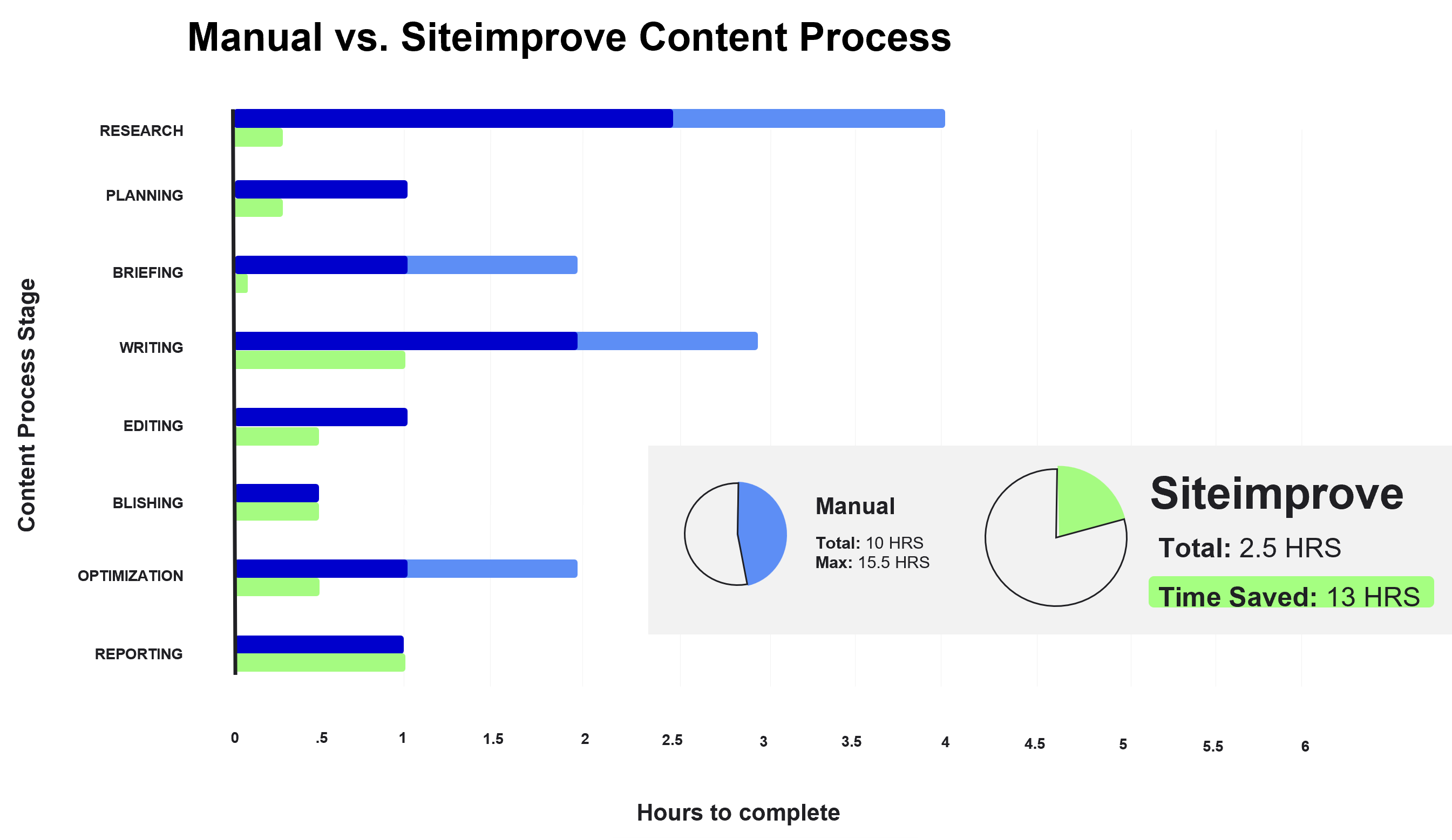
When AI is completely upsetting the apple cart with respect to content strategy, Siteimprove’s future-focused SEO Intelligence Suite is the tool to get ahead now and stay ahead later.
See your own URLs run through AI briefs, INP checks, and WCAG scans—live.
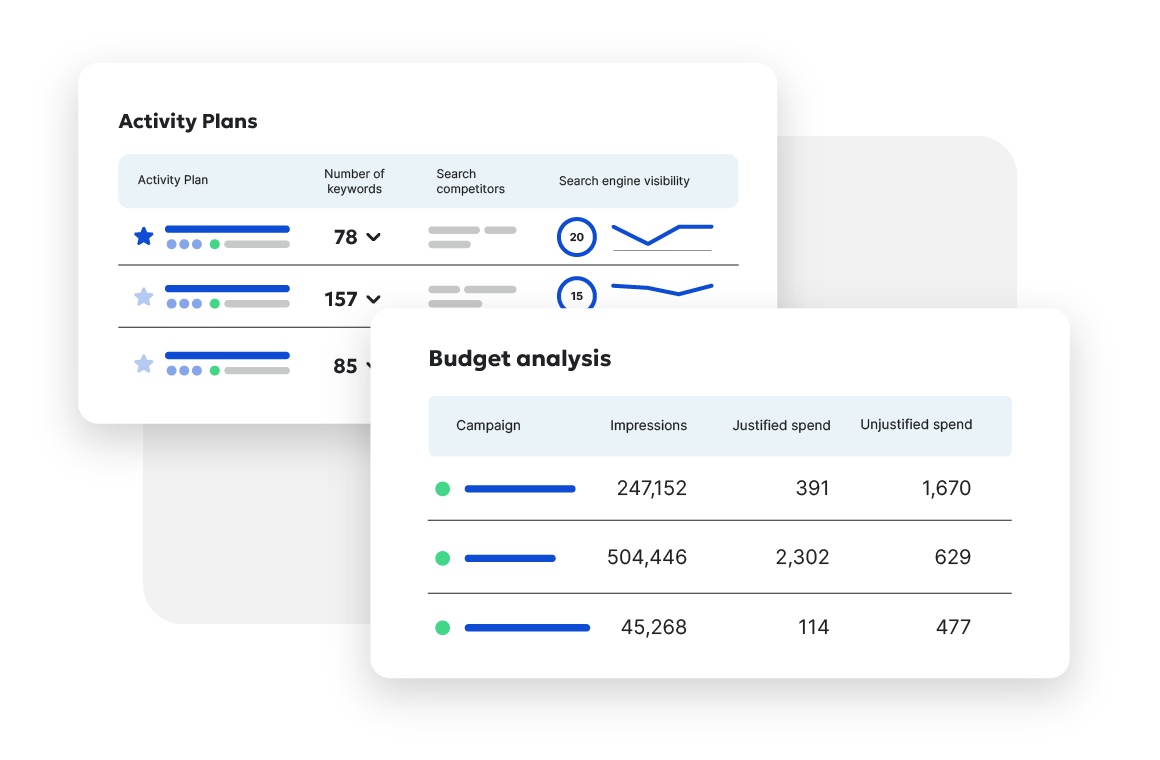
Ready to improve your Search Engine Optimization?
Siteimprove SEO is an all-in-one Enterprise SEO tool that can help you achieve your digital potential.
Schedule a demo
Renat Balandin
As a Product Marketing and Product Management leader, Renat drives impactful go-to-market strategies and cross-functional alignment for B2B/B2C SaaS, fintech, and e-commerce platforms. With a solid foundation in startup and corporate settings, he has consistently delivered user engagement, feature adoption, and revenue growth through data-driven insights and customer-centric approaches.
